Minutes after the final whistle, Vincent Temitope, a forward with Nigerian soccer club Plateau United, was bleeding after suffering a horrific cut to his neck.
Temitope was attacked after he had scored in the 3-2 loss away to Nasarawa United last month in the Nigeria Professional Football League (NPFL). His club blamed the attack in central Nigeria on supporters of the home team, with director Yaksat Maklek saying some fans attacked him “inflicting a cut on his neck region, causing sustained bleeding.”
Such instances of violence are frequent in a league in which the home teams often deploy means to win at all costs.
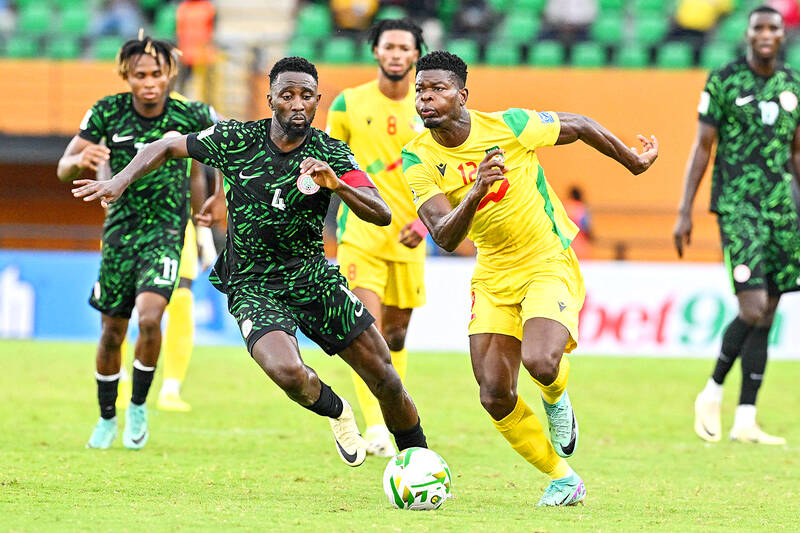
Photo: AFP
A week before Temitope was attacked, players of Lagos-based Ikorodu City were rescued from a stadium in the southwestern Nigerian city of Ibadan after earning a 1-1 draw against the home team, Shooting Stars.
Match officials reportedly had to disguise themselves as police officers to evade violent fans as they tried to leave the stadium.
Only a month before, Shooting Stars’s goalkeeping coach John Dosu was punched by an official of a visiting team.
“Desperation for victory, desperation for points, particularly for teams that want to finish amongst the top three, or teams that want to avoid a drop, is usually at the foundation of crowd violence,” Toyin Ibitoye, a former spokesman for Nigeria’s national soccer squad, the Super Eagles, said.
Fan violence at stadiums also festers, because some clubs tacitly support the perpetrators, Ibitoye said.
The result is a toxic match-day atmosphere, where fans often feel entitled to attack players and officials if results do not go their way.
Players and match officials are not the only ones at risk. The police had to fire tear gas to disperse hundreds of angry fans who stormed the pitch and went on the rampage after Nigeria failed to qualify for the 2022 FIFA World Cup.
However, analyst Emeka Nwani said that the “violence and hooliganism” are not as rampant as portrayed.
Confederation of African Football president Patrice Motsepe told reporters in Ghana last month of his “very deep and steadfast” commitment to eliminating violence in African soccer stadiums.
“To have a single fan injured at the stadium is something that we do not want to experience under any circumstance,” Motsepe said in response to a question about a recent wave of incidents across the continent.
The integrity of the Nigerian league is also threatened by dubious officiating, which officials are struggling to crack down on.
As the current season nears its climax on Sunday, league organizers are also scrambling to tackle the age-old problem of questionable officiating.
Some fans accuse referees of bias or being compromised, especially in high-stakes fixtures.
In a strongly-worded memo two weeks ago, the Nigerian Football Federation told referees across all tiers to be fair or face the consequences.
It said that referees found guilty of malpractice could face a 10-year ban and even be handed over to the police for “further investigation and prosecution.”
For many club officials, the warning was long overdue.
“That’s how you curb the mago mago we always see at this point in the league,” an official with one of the local clubs said, using local slang for foul play or manipulation.
Despite fines and stadium bans occasionally handed down by the NPFL’s board, the sanctions are often seen as merely cosmetic. Clubs are rarely held accountable beyond token punishments, and banned fans often return to stadiums undeterred.
The league fined Nasarawa United 6 million naira (US$3,744) after the attack on Plateau United’s Temitope and ordered the club to play its remaining home games in a neighboring state till the end of the season. Analysts believe that to counter the violence, the clubs and offending fans should face much tougher punishment.
“The best sanction for me, apart from banning the fans ... or banishing the club from their base, is to also deduct points,” Nwani said.
Better officiating standards, and enhanced stadium security and fan engagement could also help deter the violence, said Ibitoye, who called for “more surveillance cameras” to identify perpetrators.
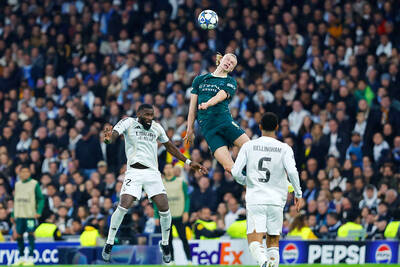
The pressure was already on Real Madrid coach Xabi Alonso before their 2-1 defeat to Manchester City on Wednesday in the UEFA Champions League raised further questions about his future. Arsenal remain perfect in this season’s competition and three points clear at the top of the standings after a 3-0 win against Club Brugge, while defending champions Paris Saint-Germain were held 0-0 at Athletic Bilbao. The clash between Madrid and City was the standout game of the round amid reports this week that Alonso had lost control of the locker room. Speculation over his position is likely to intensify after the latest
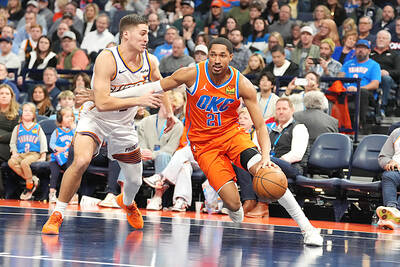
‘HIGH STANDARD’: The Thunder are on track for a Finals-Cup double after they scored 22 three-pointers in equaling the best 25-game start to a season in NBA history The Oklahoma City Thunder on Wednesday bagged a 16th straight victory, thrashing the Phoenix Suns 138-89 to romp into an NBA Cup semi-final clash with the San Antonio Spurs, who stunned the Los Angeles Lakers 132-119. NBA Most Valuable Player Shai Gilgeous-Alexander scored 28 points to lead the reigning NBA champions Thunder, who improved to 24-1 to equal the best 25-game start to a season in league history. They dominated from start to finish to book their place in the final four of the in-season tournament in Las Vegas, where they are tomorrow to take on the Spurs. The New York Knicks and
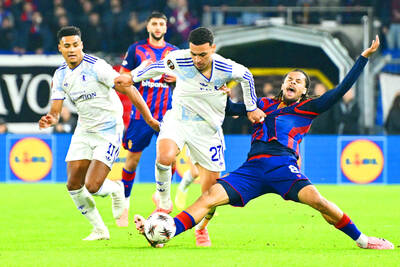
TOP OF THE TABLE: Evann Guessand put the visitors ahead early in the game and Flavius Daniliuc equalized before Youri Tielemans got the winner in the second half Aston Villa on Thursday extended their winning streak to eight games in all competitions with a 2-1 victory against Basel in the UEFA Europa League to secure at least a playoff spot. Villa were tied with Olympique Lyonnais, who beat Go Ahead Eagles 2-1, and Midtjylland, 1-0 winners over Genk, atop the standings of the second-tier European competition on 15 points with five wins from six games. They have bounced back from a poor start to the season and are third in the Premier League, including a 2-1 victory over leaders Arsenal on Saturday. At St Jakob-Park in Basel, summer signing Evann Guessand
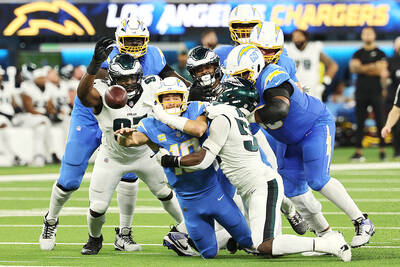
Tony Jefferson intercepted a Jalen Hurts pass in overtime to give the Los Angeles Chargers a 22-19 victory over the Philadelphia Eagles on Monday in an NFL thriller between playoff contenders. Justin Herbert, playing a week after surgery on his broken left (non-throwing) hand, withstood a career-high seven sacks to throw for 139 yards and a touchdown for the Chargers. Cameron Dicker kicked five field goals, including the 54-yard game winner in overtime. The Chargers defenders forced Hurts to throw four interceptions and surrender a fumble for a career-worst five turnovers as the Eagles fell to 8-5 with a third